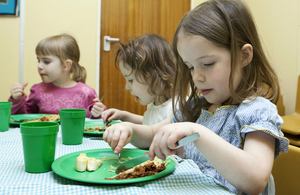Early years providers: how to promote your business
Two early years settings which have found new ways to attract business from parents and increase occupancy.

Successful techniques for filling a nursery’s places
Toad Hall Nursery Group has 15 settings in the south-east of England. Under the leadership of Chief Executive Ruth Pimentel, Toad Hall has tried a number of different ways to increase occupancy (the number of places that are filled) across the nurseries. The following ideas have been particularly successful.
Using social media
It is common for some of Toad Hall’s nurseries to have quieter days on a Monday or a Friday. The nursery group has started advertising short-term places on social media. This has been effective in quickly spreading messages throughout their network of parents and beyond, helping to fill places when they become available. It has also led to a shift in the way parents think about their bookings. Ruth says:
Parents become aware that they can add on additional sessions as they need them - when their more informal arrangements, with grandparents for example, have let them down.
Specialist sessions for quieter days
The nurseries recognise that some periods of the week will always be quieter than others. For these periods, they now offer specialist sessions with experienced leaders, including music and movement, football, gymnastics and language lessons. They offer these sessions at no extra cost to the parents, but they also encourage children to attend the nursery on these days. While the sessions are optional, they are very popular, and this allows the nurseries to increase attendance and create additional revenue on quieter days.
Toad Hall has also trialled offering additional sessions at certain points in the year to fill vacant places. For example, the nurseries ran a series of popular ‘Christmas shopping’ days for parents to book their children into while they did their last-minute shopping.
Online booking system
Toad Hall is currently introducing a new nursery management software system. This will allow parents to book extra sessions online through an app called Parentzone. Most parents are comfortable online and keen to take advantage of technology that simplifies their childcare arrangements. Ruth is hopeful that this software will increase occupancy and flexibility for parents. Toad Hall plans to launch the booking system in early 2017.
Using social media to promote a rural pre-school
Blackboys Pre-School is a committee-run rural charity pre-school in East Sussex. Former chair Daryl Willcox introduced Blackboys to the benefits of a social media presence. This has connected the pre-school to parents, friends and the wider community, as well as reducing its advertising costs.
When Daryl first joined Blackboys there were financial concerns at the pre-school because not enough places were being filled. Instead of cutting back on their services, Blackboys decided to confront this challenge through digital marketing. Their social media presence was just one of a handful of approaches to sustain the pre-school through this difficult period.
Developing social media guidelines
The first and most important step was to get staff on board, Daryl notes. Their sense of ownership and control of the pre-school’s Facebook page was essential to the initiative’s success. Blackboys also felt it was important to establish social media guidelines for staff and parents. These included rules like never identifying individual children online and only uploading photos of children whose parents had agreed to this. The pre-school added a line to an existing parental consent form to include this. Since then, staff have embraced the use of social media as a marketing tool.
Designated members of staff and committee members act as administrators on the Facebook page. They keep an eye on what is being posted and regularly update the content. Typically, these updates are photos of activities and outings, although the page is also a great place to remind parents about upcoming events and dates for their diaries. Once staff were routinely using the Facebook account, the pre-school introduced Twitter and is using it to reach out to its wider community.
Creating an online ‘shop window’
Blackboys’ Facebook and Twitter accounts have helped to spread the word about the pre-school to parents and friends, who in turn engage with and share their content, spreading the word further into the community. This raises the school’s profile in a very cost-effective way. Blackboys doesn’t spend a penny on Facebook marketing, and their social media presence has meant they spend less on other advertising methods.
Daryl notes that this constant and cheap visibility works well for smaller settings because the Facebook page almost becomes a ‘shop window’ for the setting, where parents engage with the page and post questions and comments.
The present manager Jenny Novkovic believes that social media is a great tool to promote the pre-school. She also points out that settings should not forget to maintain existing areas of marketing. This can include organising and attending community fundraising events, and raising awareness by word of mouth and up-to-date leaflets and prospectuses.